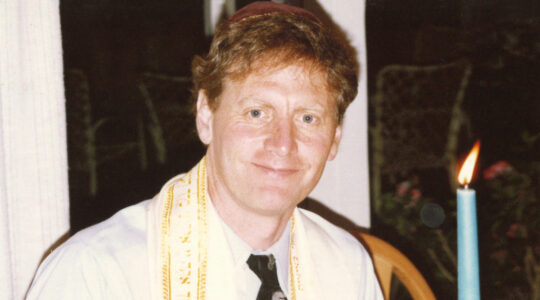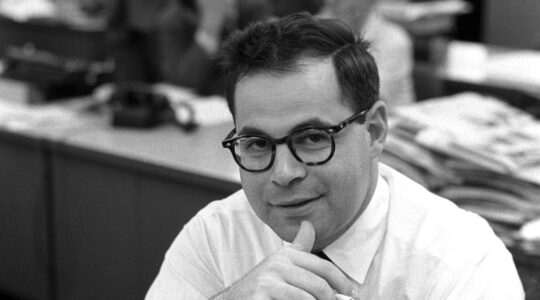This article is also available as a weekly newsletter, “Life Stories,” where we remember those who made an outsize impact in the Jewish world — or just left their community a better or more interesting place. Subscribe here to get “Life Stories” in your inbox every Tuesday.
Lynda Obst, 74, Hollywood producer of famed rom-coms
Lynda Obst, a film producer whose credits include “The Fisher King,” “Interstellar,” “How to Lose a Guy in 10 Days,” “Contact,” “Hope Floats,” “One Fine Day” and “Sleepless in Seattle,” died Oct. 22 at her home in Los Angeles. She was 74.
Born in Manhattan and raised in Harrison, New York, Obst was an editor at The New York Times magazine before coming to Hollywood in the late 1970s. She produced her friend Nora Ephron’s directorial debut, “This Is My Life” (1992), and was the executive producer for Ephron’s wildly successful romantic comedy “Sleepless in Seattle” in 1993.
In a 2019 interview with the Jewish Journal, she spoke about becoming more engaged with Jewish life during her son’s recovery from drug addiction. “I was bereft that I had worked so hard at raising him but it didn’t occur to me that leaving God out would be such an important thing,” she said. “So I began to want to really know what my own tradition was.”
Baruch Thaler, 56, a “rebbe to seekers and holy boundary crossers”

Baruch Thaler worked on Yiddish translation for the Milken American Jewish Music Archives and others. (Courtesy Open Siddur Project)
Rabbi Baruch Thaler grew up and was ordained in the Chabad-Lubavitch tradition, and was a composer of niggunim, or mostly wordless melodies, that are sung by members of the Hasidic movement.
Later in life he embraced the spirit of Jewish Renewal, and came to lead Nitzotzot (Sparks) in Brooklyn, an egalitarian community whose members include formerly haredi Orthodox Jews looking to express their Judaism in different and creative ways.
He earned an MFA in film from Columbia University, translated and appeared in Yiddish stage classics for the National Yiddish Theatre Folksbiene and the New Yiddish Rep, and worked as a translator for the Milken Archive of Jewish Music.
Thaler “was a friend and teacher to so many, a true rebbe to seekers and holy boundary crossers like himself,” a friend, Yosef Goldman, wrote on Facebook. Thaler died Nov. 7. He was 56.
Anne Golomb Hoffman, 78, Jewish scholar at a Jesuit university

Anne Golomb Hoffman published extensively on the politics of gender in Israeli and European Jewish writing. (Courtesy The Things They Carry Project)
Anne Golomb Hoffman wore many hats. She was a scholar of the history of psychoanalysis and an accomplished painter.
As a professor of English and Modern Hebrew Literature at Fordham University, the Jesuit university in the Bronx, her specialties included modernist Hebrew writers like S.Y. Agnon, contemporary Israeli fiction, and Freud and psychoanalysis. In the 1990s, she created the annual Nostra Aetate Dialogue, hosting conversations in Jewish-Catholic reconciliation, as well as Fordham’s Jewish Texts Reading Group.
“The Jesuit appreciation for diverse perspectives and fields of inquiry has provided me with extraordinary opportunities to develop my interests in Hebrew literature and Jewish Studies,” she told an interviewer in 2023.
Hoffman died Nov. 4. She was 78.
Charles Fenyvesi, 86, gardening columnist and Jewish journalist

Born in a small town in Hungary in 1937, Charles Fenyvesi and his parents managed to survive the Holocaust on forged papers. (Fenyvesi family via The Washington Post)
For 20 years, Charles Fenyvesi wrote the beloved “Ornamental Gardener” column for The Washington Post, once explaining that a “great garden happens over a long span of time, and there is never a final score in the battle between nature’s will and its tenants’ whims.”
He also had stints as the Washington correspondent for The Jerusalem Post and Haaretz, as editor of the Washington Jewish Week and as editor of the Washington Whispers page for U.S. News & World Report.
Fenyvesi and his family survived the Holocaust on forged papers and left Hungary as Jewish refugees after the 1956 anti-Soviet uprising. In his lyrical 1990 book “When the World Was Whole,” he wrote about Hungary and his own family’s attachment to the country’s land and culture. “Telling stories about such a world helps restore it,” he wrote.
Fenyvesi died Nov. 3 at a hospice center in Los Angeles. He was 86.
Erich Goldhagen, 94, scholar of the Holocaust
Erich Goldhagen, a retired lecturer in Jewish Studies at Harvard who for 25 years taught a course there on the Holocaust and genocide, died Oct. 23 at 94.
A survivor of the Romanian-Jewish ghetto in Czernowitz, now in Ukraine, Goldhagen rarely discussed his own experiences but wrote widely on antisemitism, ethnic minorities, Eastern European Jewry and Albert Speer, Hitler’s war production chief. In 1965, he was tapped to lead the newly inaugurated Institute of East European Jewish Affairs at Brandeis University.
“My father had a hard life, being consumed by and emerging from the Holocaust,” his son, the political scientist and former Harvard professor Daniel Jonah Goldhagen, wrote in a note announcing his passing. “He also had a wonderful life, in great part because of his loving, adoring wife Norma of 67 years, who he would say is saintly.”
JTA has documented Jewish history in real-time for over a century. Keep our journalism strong by joining us in supporting independent, award-winning reporting.






